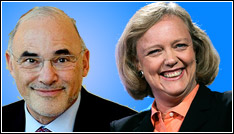After the TouchPads and phones came into the marketplace in July 2011 and did not sell well, Apotheker replaced Jon Rubinstein, head of the webOS group, on July 11 and announced it would pull all the webOS computers and phones from the market. HP then decided to lower the price of the TouchPads to $99 (£64), and they promptly became the best-selling such device on the market until they sold out.

Meanwhile, the stock price continued to tank. Later, on 18 August, Apotheker announced at the company’s quarterly earnings conference call that HP had decided to do away with the webOS division entirely, as well as the long-established and highly successful Personal Systems Group, which recorded $41 billion(£27bn) in sales in 2010.
Largely as a result of all this uncertainty, HP saw its stock price plunge by as much as 47 percent while it cut revenue forecasts at least three times. At the same time, Apotheker proactively tried to shift HP’s focus to software, announcing that it was going to buy infrastructure software maker Autonomy for $10 billion (£6.5bn) to boost its enterprise software portfolio in search, content management and several other areas.
Although the Autonomy transaction has not yet closed, it likely will be consummated despite the change in leadership.
Shares Gain $3 Billion In A Day
HP shares jumped seven percent on 21 September to a shade under $24 (£16) on the initial report by Bloomberg News that Apotheker might be replaced. Wall Street analysts estimated that the one-day surge added $3 billion (£2bn) to the value of the company.
Apotheker, a former chief executive of German software manufacturer SAP, was announced on 30 September, 2010, to replace another ousted HP CEO, Mark Hurd (pictured), who had become enmeshed in internal administrative snags and a sexual-harassment lawsuit brought by a female contractor.
 A month to the day after he was ousted, Hurd moved to HP competitor Oracle on 6 September, 2010, where he became co-president of the company under longtime friend and ally Larry Ellison.
A month to the day after he was ousted, Hurd moved to HP competitor Oracle on 6 September, 2010, where he became co-president of the company under longtime friend and ally Larry Ellison.
Apotheker had a 20-plus-year career with SAP in several positions before being named sole CEO in May 2009 after serving as co-CEO with Henning Kagermann for one year. He resigned under pressure in February 2010 after SAP earnings reports slumped on his watch during the macroeconomic crisis of that time.
The HP board, which has often absorbed flak from shareholders, analysts and former board members ever since it broke ties with the Hewlett and Packard families 10 years ago during the Compaq acquisition, is getting close scrutiny again as a result of a solid 12 months of problems.
Board Did Not Meet Apotheker
There is more intrigue. A report in The New York Times detailed the recruitment of Apotheker and contended that most of the board members never even met Apotheker before he was hired.
“The board has to have some level of culpability here,” longtime IT industry analyst Steve Duplessie of Enterprise Strategy Group told eWEEK. “They picked him. They let him publicly say he was getting rid of the PC business – which effectively gives HP buying power across their entire spectrum of offerings – then backpedal all over the place.
“An interim CEO … will do nothing other than calm things down and slow things down, and then after a much-thought-out search, we’ll have a new chief. That interim CEO ought to publicly declare that the PC business is absolutely not for sale [even if it is], stem the tide of customer defections and shore up market sentiment,” Duplessie said.




